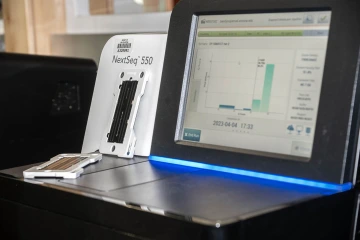Cracking the Code with Genome Sequencing
Sept. 18, 2023
Researchers across the UArizona Health Sciences utilize the genome sequencers on campus. Some of them and their research focuses include:
PANDA Core for Genomic and Microbiome Research
Image

The NextSeq 550 genome sequencer at the UArizona Genetics Core offers next-generation sequencing to Health Sciences researchers as a complement to the PANDA Core’s NovaSeq 6000.
- Influence of high-fat diets and hypoxia on human gut microbiome and autoimmune diseases like colitis and inflammatory bowel disease – Fayez Ghishan, MD, chair, Department of Pediatrics, and director, Steele Children’s Research Center, College of Medicine – Tucson; and medical director, Clinical and Translational Sciences (CATS) Research Center, UArizona Health Sciences
- Sequencing of vaginal microbiome to better understand endometriosis and cancer risks – Melissa Herbst-Kralovetz, PhD, associate professor and obstetrics and gynecology director, College of Medicine – Phoenix, and member, Cancer Prevention and Control Program, UArizona Cancer Center; and Corrie Whisner, PhD, associate professor, Center for Health Through Microbiomes, Arizona State University Biodesign Institute
- 1) How gut microbiome of children with congenital heart disease repair is affected by perioperative antibiotics and whether timing and type of nutrition protects against organ dysfunction after surgery; 2) GI tract bacteria strains as risk factors for kidney or other organ dysfunction after surgery; and 3) can nutrition improve gut microbiome, lung function and overall inflammation in children with acute lung disease – Katri Typpo, MD, associate professor and chief, Critical Care Division, Department of Pediatrics, College of Medicine – Tucson
- Molecular basis of mutagenesis and dysfunctional DNA repair related to human diseases including cancer and autoimmunity – Joanne Sweasy, PhD, director, UArizona Cancer Center, and professor, Department of Cellular and Molecular Medicine, College of Medicine – Tucson
UArizona Core Facilities – Arizona Genetics Core, or AZGC*
- Why are some babies born prematurely and what might the genetic basis for that be? – David Harris, PhD, professor, Department of Immunobiology, College of Medicine – Tucson; executive director, UArizona Health Sciences Biorepository; and member, BIO5 Institute
- Genetic biomarkers and signaling pathways governing chronic GI inflammation that can lead to gastric, colon and other cancers – Juanita L. Merchant, MD, PhD, professor and chief, Division of Gastroenterology and Hepatology, Department of Medicine, College of Medicine – Tucson; associate director for basic sciences, UArizona Cancer Center; and member, BIO5 Institute and Cancer Biology Graduate Interdisciplinary Program, UArizona.
- Metabolic mechanisms that precede disease manifestation regarding pulmonary vascular cell dysfunction in pulmonary hypertension and acute lung injury – Ruslan Rafikov, PhD, associate professor, Division of Endocrinology, Department of Medicine, College of Medicine – Tucson, and Clinical Translational Sciences, UArizona Health Sciences; and member, BIO5 Institute
- How certain viral infections can protect patients from relapse following hematopoietic stem cell transplantation for cancer immunotherapy – Richard Simpson, PhD, professor, School of Nutritional Sciences and Wellness, CALS; associate professor, Pediatric Hematology-Oncology Division and Steele Children’s Research Center, College of Medicine – Tucson; and member, Clinical and Translational Oncology Program, UArizona Cancer Center, and BIO5 Institute
* NOTE: The University of Arizona Genetics Core Clinical Services, whose services include genomic analysis for clinical diagnoses, and Arizona Genetics Core (AZGC), which focuses on basic sciences research, are two divisions under the larger UArizona Facilities Core, which is part of the Office of Research, Innovation and Impact.

